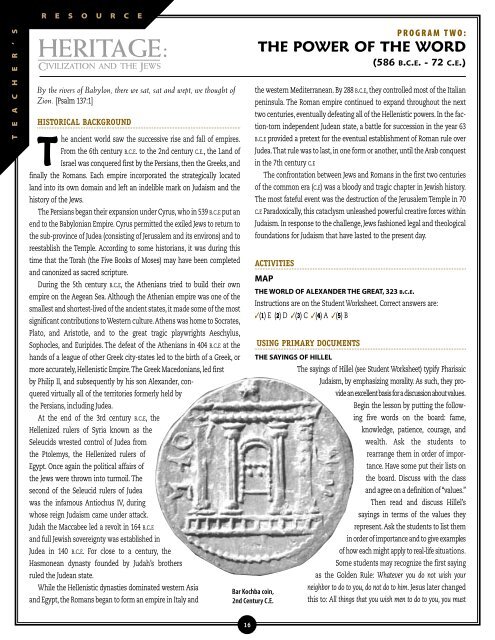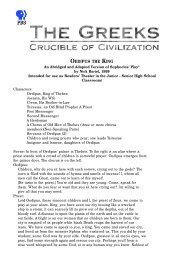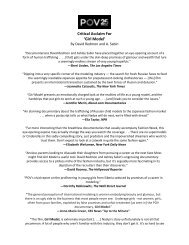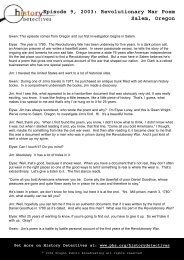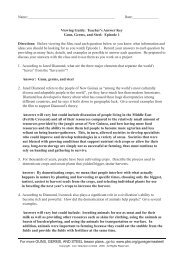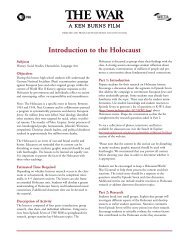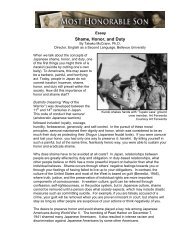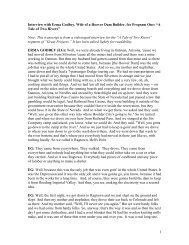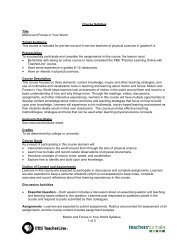HERITAGE: Civilization and the jews - PBS
HERITAGE: Civilization and the jews - PBS
HERITAGE: Civilization and the jews - PBS
You also want an ePaper? Increase the reach of your titles
YUMPU automatically turns print PDFs into web optimized ePapers that Google loves.
R E S O U R C E<br />
T E A C H E R ’ S<br />
<strong>HERITAGE</strong>:<br />
CIVILIZATION AND THE JEWS<br />
PROGRAM TWO:<br />
THE POWER OF THE WORD<br />
(586 B.C.E. - 72 C.E.)<br />
By <strong>the</strong> rivers of Babylon, <strong>the</strong>re we sat, sat <strong>and</strong> wept, we thought of<br />
Zion. [Psalm 137:1]<br />
HISTORICAL BACKGROUND<br />
<strong>the</strong> western Mediterranean. By 288 B.C.E, <strong>the</strong>y controlled most of <strong>the</strong> Italian<br />
peninsula. The Roman empire continued to exp<strong>and</strong> throughout <strong>the</strong> next<br />
two centuries, eventually defeating all of <strong>the</strong> Hellenistic powers. In <strong>the</strong> faction-torn<br />
independent Judean state, a battle for succession in <strong>the</strong> year 63<br />
The ancient world saw <strong>the</strong> successive rise <strong>and</strong> fall of empires. B.C.E provided a pretext for <strong>the</strong> eventual establishment of Roman rule over<br />
From <strong>the</strong> 6th century B.C.E. to <strong>the</strong> 2nd century C.E., <strong>the</strong> L<strong>and</strong> of Judea.That rule was to last, in one form or ano<strong>the</strong>r, until <strong>the</strong> Arab conquest<br />
Israel was conquered first by <strong>the</strong> Persians, <strong>the</strong>n <strong>the</strong> Greeks, <strong>and</strong> in <strong>the</strong> 7th century C.E<br />
finally <strong>the</strong> Romans. Each empire incorporated <strong>the</strong> strategically located<br />
l<strong>and</strong> into its own domain <strong>and</strong> left an indelible mark on Judaism <strong>and</strong> <strong>the</strong><br />
history of <strong>the</strong> Jews.<br />
The Persians began <strong>the</strong>ir expansion under Cyrus, who in 539 B.C.E put an<br />
end to <strong>the</strong> Babylonian Empire. Cyrus permitted <strong>the</strong> exiled Jews to return to<br />
<strong>the</strong> sub-province of Judea (consisting of Jerusalem <strong>and</strong> its environs) <strong>and</strong> to<br />
The confrontation between Jews <strong>and</strong> Romans in <strong>the</strong> first two centuries<br />
of <strong>the</strong> common era (C.E) was a bloody <strong>and</strong> tragic chapter in Jewish history.<br />
The most fateful event was <strong>the</strong> destruction of <strong>the</strong> Jerusalem Temple in 70<br />
C.E Paradoxically, this cataclysm unleashed powerful creative forces within<br />
Judaism. In response to <strong>the</strong> challenge, Jews fashioned legal <strong>and</strong> <strong>the</strong>ological<br />
foundations for Judaism that have lasted to <strong>the</strong> present day.<br />
reestablish <strong>the</strong> Temple. According to some historians, it was during this<br />
time that <strong>the</strong> Torah (<strong>the</strong> Five Books of Moses) may have been completed ACTIVITIES<br />
<strong>and</strong> canonized as sacred scripture.<br />
MAP<br />
During <strong>the</strong> 5th century B.C.E, <strong>the</strong> A<strong>the</strong>nians tried to build <strong>the</strong>ir own<br />
THE WORLD OF ALEXANDER THE GREAT, 323 B.C.E.<br />
empire on <strong>the</strong> Aegean Sea. Although <strong>the</strong> A<strong>the</strong>nian empire was one of <strong>the</strong><br />
Instructions are on <strong>the</strong> Student Worksheet. Correct answers are:<br />
smallest <strong>and</strong> shortest-lived of <strong>the</strong> ancient states, it made some of <strong>the</strong> most<br />
✓(1) E (2) D ✓(3) C ✓(4) A ✓(5) B<br />
significant contributions to Western culture. A<strong>the</strong>ns was home to Socrates,<br />
Plato, <strong>and</strong> Aristotle, <strong>and</strong> to <strong>the</strong> great tragic playwrights Aeschylus,<br />
Sophocles, <strong>and</strong> Euripides. The defeat of <strong>the</strong> A<strong>the</strong>nians in 404 B.C.E at <strong>the</strong><br />
h<strong>and</strong>s of a league of o<strong>the</strong>r Greek city-states led to <strong>the</strong> birth of a Greek, or<br />
more accurately, Hellenistic Empire.The Greek Macedonians, led first<br />
by Philip II, <strong>and</strong> subsequently by his son Alex<strong>and</strong>er, conquered<br />
virtually all of <strong>the</strong> territories formerly held by<br />
<strong>the</strong> Persians, including Judea.<br />
At <strong>the</strong> end of <strong>the</strong> 3rd century B.C.E, <strong>the</strong><br />
Hellenized rulers of Syria known as <strong>the</strong><br />
USING PRIMARY DOCUMENTS<br />
THE SAYINGS OF HILLEL<br />
The sayings of Hillel (see Student Worksheet) typify Pharisaic<br />
Judaism, by emphasizing morality. As such, <strong>the</strong>y provide<br />
an excellent basis for a discussion about values.<br />
Begin <strong>the</strong> lesson by putting <strong>the</strong> following<br />
five words on <strong>the</strong> board: fame,<br />
knowledge, patience, courage, <strong>and</strong><br />
Seleucids wrested control of Judea from<br />
wealth. Ask <strong>the</strong> students to<br />
<strong>the</strong> Ptolemys, <strong>the</strong> Hellenized rulers of<br />
Egypt. Once again <strong>the</strong> political affairs of<br />
<strong>the</strong> Jews were thrown into turmoil. The<br />
second of <strong>the</strong> Seleucid rulers of Judea<br />
was <strong>the</strong> infamous Antiochus IV, during<br />
whose reign Judaism came under attack.<br />
Judah <strong>the</strong> Maccabee led a revolt in 164 B.C.E<br />
<strong>and</strong> full Jewish sovereignty was established in<br />
Judea in 140 B.C.E. For close to a century, <strong>the</strong><br />
Hasmonean dynasty founded by Judah’s bro<strong>the</strong>rs<br />
ruled <strong>the</strong> Judean state.<br />
rearrange <strong>the</strong>m in order of importance.<br />
Have some put <strong>the</strong>ir lists on<br />
<strong>the</strong> board. Discuss with <strong>the</strong> class<br />
<strong>and</strong> agree on a definition of “values.”<br />
Then read <strong>and</strong> discuss Hillel’s<br />
sayings in terms of <strong>the</strong> values <strong>the</strong>y<br />
represent. Ask <strong>the</strong> students to list <strong>the</strong>m<br />
in order of importance <strong>and</strong> to give examples<br />
of how each might apply to real-life situations.<br />
Some students may recognize <strong>the</strong> first saying<br />
as <strong>the</strong> Golden Rule: Whatever you do not wish your<br />
While <strong>the</strong> Hellenistic dynasties dominated western Asia<br />
neighbor to do to you, do not do to him. Jesus later changed<br />
Bar Kochba coin,<br />
<strong>and</strong> Egypt, <strong>the</strong> Romans began to form an empire in Italy <strong>and</strong><br />
2nd Century C.E.<br />
this to: All things that you wish men to do to you, you must<br />
16


